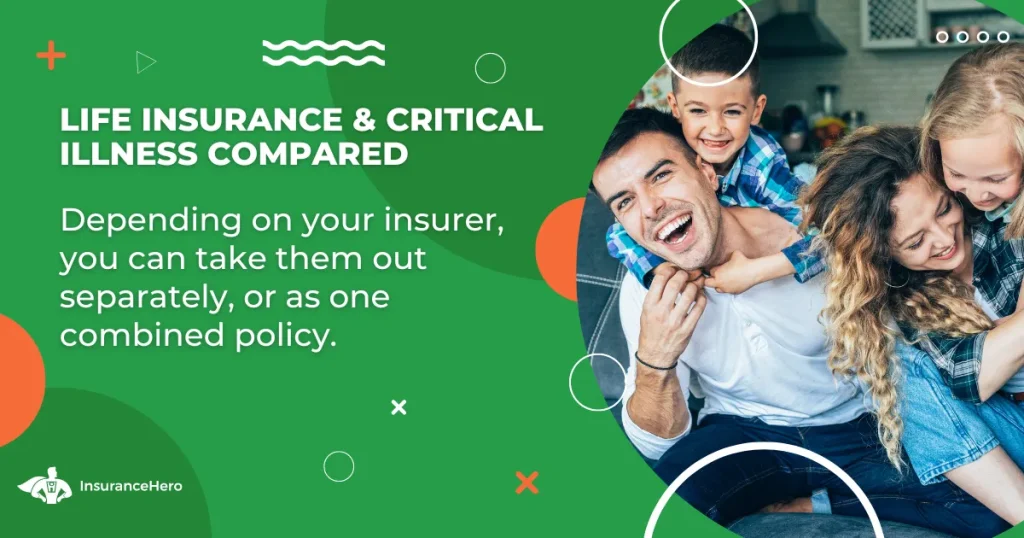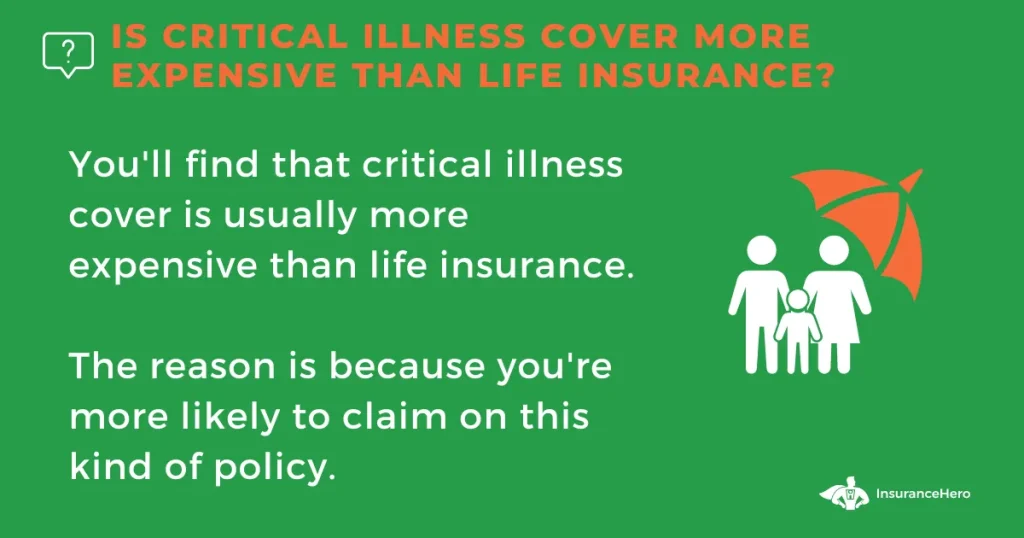Life Insurance And Critical Illness Cover A Comparison

Do you wonder which insurance – life insurance or critical illness cover would be the more suitable choice in your circumstances?
Although it’s good to hope for the best, having a solid contingency plan in place is what will give you peace of mind.
Whether it is an illness that makes it impossible for you to work or your sudden passing away, it’s a situation that leaves your family vulnerable and can potentially cause some financial turbulence.
You can avoid that by purchasing life insurance coverage or critical illness cover to secure your loved one’s financial future and take care of yourself even when you’re unable to.
This guide explains the differences between life insurance and critical illness coverage so you can decide which type of insurance best suits you.
Compare Quotes From The UK’s Top Providers, Completely Free Quote Service, Save Money Now

Are Critical Illness Cover and Life Insurance the Same Type of Coverage?
Critical illness coverage and life insurance are not the same type of insurance. There are some considerable disparities between the two policies. The most important one is the main purpose of each cover.
Life Insurance
Life insurance is designed to secure your family when you pass away. After your death, beneficiaries can claim the policy and receive the payout. This money can go toward covering funeral costs, the mortgage, paying off any financial liabilities, and living and educational costs.
There are three main types of life insurance:
Level-term life insurance is characterised by fixed premiums and the amount of financial coverage. This means that the payout from the policy is clear from the beginning and does not change during the policy’s term.
Decreasing term life insurance is designed to secure substantial financial obligations, like mortgages. Within the term of the policy, premiums and payouts are decreasing.
Increasing term life insurance is the opposite of decreasing term life insurance, allowing you to secure your loved ones with a payout that slowly increases during the policy’s term. It’s a great way to ensure the amount your family receives is not reduced by inflation.
Life insurance is a valuable safety net you can leave to those you care about. With different policies, you can adjust them to your needs, selecting the most beneficial and sensible plan for your life circumstances.
Critical Illness Cover
Critical illness cover protects you against financial turmoil if you are diagnosed with a critical illness defined within the terms of the policy.
This coverage is paying out one tax-free lump sum to cover the costs related to your condition (medical equipment, necessary modifications to your home, etc.) or the costs of living and other financial obligations once you cannot work.
This policy will pay out only when you receive a diagnosis that is included in the policy. The most common conditions you can insure yourself for are a stroke, heart attack, various types of cancer, Parkinson’s disease, Alzheimer’s disease, and the loss of a limb.
You can only claim under the policy if you are diagnosed during its term. Critical illness coverage is one of the most popular choices amongst those with high-risk professions and those who are the only breadwinners.
Life Insurance vs Critical Illness Cover – Main Differences
Both life insurance and critical illness cover (for example, for high-net-worth clients) offer substantial benefits, allowing you to secure your family and yourself in case of significant life events.
Depending on your lifestyle, profession, and other factors, such as outstanding financial obligations, you may be inclined to choose a life insurance policy, critical illness cover, or both.
Let’s examine the main differences between the two coverages to make this decision easier.
| Life Insurance | Critical Illness Cover |
|---|---|
| Critical illness coverage pays a lump sum when the policyholder is diagnosed with a covered critical illness during the policy’s term. | Life insurance helps protect your family from financial hardship, making it a suitable option if you have dependents. |
| The policy can be claimed after the policyholder’s death. | The policy can be claimed only when the policyholder is still alive. |
| Critical illness coverage can offer you support if you cannot work due to an illness. It might be a solid choice even if you don’t have any dependents. | Critical illness coverage can offer you support once you cannot work due to an illness. It might be a solid choice even if you don’t have any dependents. |
In both cases, an insurance company cannot dictate to the policy’s beneficiaries how the policy proceeds can be spent. And in both policies, the payout is tax-free and issued in one lump sum. Once paid out, the policies are discontinued.
Another important similarity between the two insurance policies is that both require medical underwriting.
To be accepted for life insurance or critical illness coverage, you will be required to undergo a medical examination, during which you may be obligated to disclose information about the history of illnesses in your family, your medical history, your lifestyle, and any risk factors present in your life.
This information will help an insurance company determine what level of risk you introduce and whether you qualify for coverage. Aspects such as your age and gender will also contribute to the costs of your insurance.

Can You Buy Life Insurance with Critical Illness Coverage?
Yes, you can buy critical illness coverage with your life insurance policy as a single product. It’s not an option offered by every insurer, but many companies do provide such a solution to their clients.
You can add critical illness coverage to your life insurance when you purchase or combine it with an existing policy later.
If you’re interested in joining the two policies, discussing this issue during the initial application process is worth discussing. Even if you’re not considering this for now, you may want to have that option in the future.
Combining life insurance and critical illness coverage into a single product offers significant advantages. You can increase your coverage and pay one monthly premium instead of two.
However, knowing that the joint policy will pay out only once is crucial. This means the policy can be claimed either when you fall ill or upon your death, not in both cases.
If you wish to fully benefit from both policies, it might be better to keep them separate. It may be more costly, but you protect yourself in every scenario these policies cover you.
When Is the Best Time to Purchase Both of These Covers?
The answer to that question will look different for everyone. There is no wrong time to buy insurance, but there are some substantial benefits to doing it earlier in life. Term life policies can cover you for up to 40 years, and whole life insurance will not expire throughout your life.
Younger people without major health issues can buy life insurance at more affordable prices and are more likely to be accepted.
If you’re taking a mortgage, it’s also a good time to consider some safety net. A decreasing life insurance policy can offer you peace of mind – even if you pass away. You won’t leave your family with a serious financial burden.
Similarly, there is no one right moment to get critical illness coverage. Suppose your job presents risks that, over time, can contribute to developing serious health conditions. You may want to look into your insurance coverage options and add them to your policy.
The same goes for when you welcome a new addition to your family. If you’re the sole breadwinner in your household, the risks of being unable to work for an extended period may be quite considerable, especially when you have children.
Even when you don’t have any dependents, having this extra form of protection in the most vulnerable time of life is very beneficial. Thanks to that, you can focus on recovery rather than worry about your financial standing.
With life insurance and critical illness coverage, insurance providers will consider your age, health history, current health, and the length of your policy’s term. The earlier in life you decide to buy coverage, the more affordable it will be.
If you’re looking for the best life insurance for you and your family, get in touch with us. Insurance Hero specialises in providing comprehensive information on plans from leading life insurance companies. Contact our Experts and find the most affordable coverage.
Are Premiums the Same for Both Policies?
If you have one joint policy that includes life insurance and critical illness cover, you will have to pay only one monthly premium. The cost of a policy is calculated based on your age, cover amount, the length of the policy’s term, and other aspects like your lifestyle choices, occupation and health.
You can expect to pay more for critical illness coverage, as insurance companies bear a greater risk with this type of policy. You’re more likely to fall ill during the policy’s term than to pass away.
The amount you’ll pay in monthly premiums for both insurance policies will vary depending on your individual circumstances.
You can easily compare life and critical illness cover plans with Insurance Hero and the most affordable option. See how much insurance you need to take care of your family and yourself.

Life Insurance, Critical Illness Cover, and Income Protection
Both critical illness cover and an income protection policy can help you stand on your feet when you become severely ill, but they are not the same product. Income protection insurance can offer you a payout based on your salary percentage when you cannot work.
You may use these funds to pay for necessary medical expenses and cover living costs while not working. Unlike life insurance or critical illness coverage, an income protection policy offers regular payments until you recover and can return to work.
Income protection provides coverage for conditions that are rarely included in critical illness policies. For example, you can benefit from the payout from this insurance in instances when you suffer from depression or some milder injuries, like a back injury.
For this reason, if you care about obtaining full coverage, purchasing both policies might be better than buying only one.
Critical Illness vs Life Insurance – Which Is Better?
Life insurance and critical illness coverage serve different purposes and can be applied in different situations. If you wish to secure your family’s financial future after your death, life insurance is a product you may want to consider.
However, if you’re looking for coverage that will protect you in case you’re unable to work due to severe injury or illness, a critical illness cover or income protection cover will make more sense.
The good news is that you don’t have to choose between the two types of coverage. Many insurers offer life insurance with critical illness coverage as a joint policy. You can benefit from full protection, regardless of the life circumstances awaiting you and your loved ones.
Compare plans from the leading life insurance companies with Insurance Hero and find the coverage that will help you sleep peacefully at night. Trust the Experts in the industry and make informed decisions about your future today.
Life Insurance and Critical Illness Cover FAQs
What does critical illness life insurance cover?
Critical illness life insurance can cover you if you get diagnosed with a critical illness or injury, making it impossible for you to work.
On the list of most common conditions that can be included in your critical illness coverage, we can find:
- Heart attack
- Stroke and loss of blood flow to the brain
- Cancer, including cancers of the skin and dermal layers
- Alzheimer’s
- Serious brain injury
- Loss of limbs
- Multiple sclerosis brain disease
- Liver or kidney failure
- Paralysis
- Third-degree burns
- Total permanent disability
Different policies will include different variations of this list, and you can receive a payout from your policy only when you are diagnosed with a condition you are insured for.
Does life insurance come with critical illness coverage?
Yes, you can purchase life insurance with critical illness coverage in one product. This might be a beneficial solution if you wish to reduce your coverage costs and pay a single monthly instalment.
Buying a joint coverage policy like that will require only one application, but you will be obligated to undergo medical underwriting.
Some insurance companies may require purchasing one joint policy (life insurance plus critical illness cover), while others may not offer this option.
How much critical illness is enough?
The amount you can insure yourself for should depend on your salary and your living expenses. Insuring yourself for at least three years is reasonable, but this may look different for everyone.
To calculate the amount you wish to insure yourself for, multiply your yearly income by the number of years you want the payout from your insurance to cover you for (in this case, three).
How much is a good amount for life insurance?
Most insurance companies recommend an amount that is 6 to 15 times your annual salary. The payout from life insurance can serve various purposes, so the amount should depend on what kind of protection you want to leave your family with.
Steve Case is a seasoned professional in the UK financial services and insurance industry, with over twenty years of experience. At Insurance Hero, Steve is known for his ability to simplify complex insurance topics, making them accessible to a broad audience. His focus on clear, practical advice and customer service excellence has established him as a respected leader in the field.



